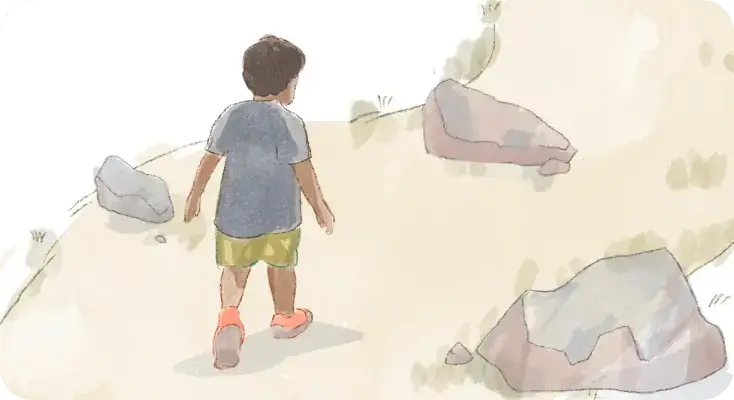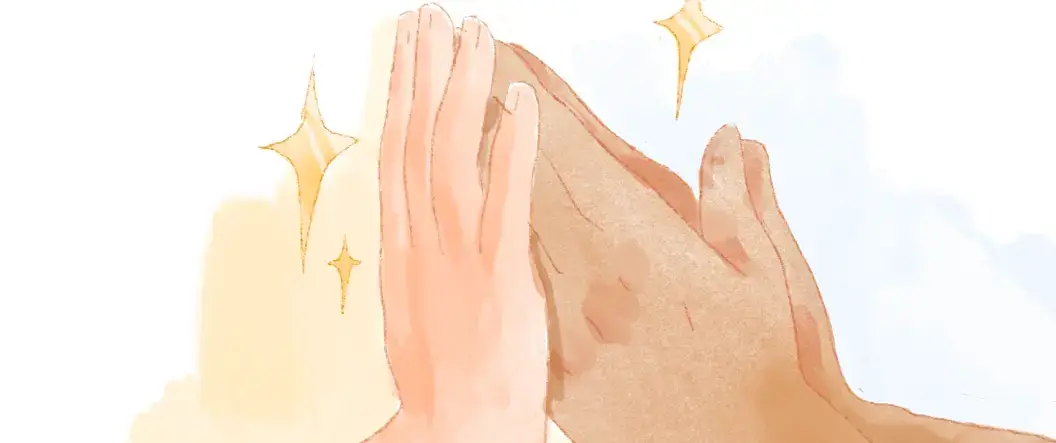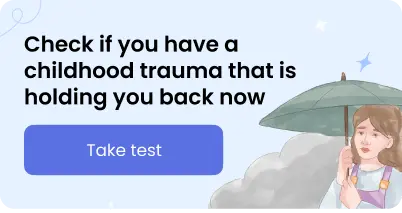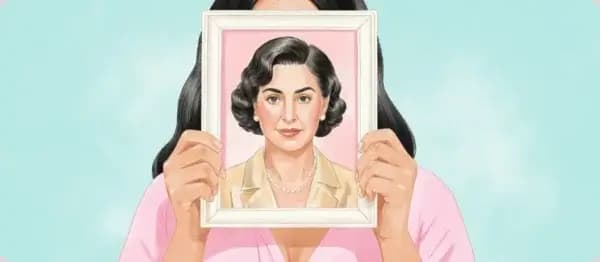Key takeaways about the process of overcoming childhood trauma
- Can you heal from childhood trauma in adulthood? Yes, some strategies can help you develop coping skills and reduce the symptoms or even overcome trauma.
- To cope with past experiences, you might need to accept that a traumatic event has happened, acknowledge your emotions, and gradually turn to positive thoughts.
- When seeking therapy, keep in mind that all emotions are vital. Trust the process, and embrace every step of your healing journey.
- The most effective approaches to getting over trauma are eye movement desensitization & reprocessing therapy (EMDR), cognitive processing therapy (CPT), trauma-focused cognitive behavioral therapy (TF-CBT), and narrative exposure therapy (NET).
How to treat childhood trauma in adults
“Trauma comes back as a reaction, not a memory.” — Bessel Van Der Kolk, Dutch psychiatrist and author.
- How to get over childhood trauma?
- How to start living without the shadow of the past standing behind me?
- How to learn to be happy even after all the things that happened?
These are only a few questions that may keep you awake at night. Luckily, you’re not alone.
Mental health professionals have outlined various tips for healing childhood trauma in adults. Check out the simplest and the most effective steps.
1. Accept that a traumatic event has happened
How to get past childhood trauma? Acknowledge that trauma is a part of your emotional baggage. Though you can’t change it, you can heal from it. One of the worst things you can do is convince yourself that nothing serious happened.
Appreciating the fact that you’re not guilty of anything is a powerful step to treating childhood trauma.
As a way to protect ourselves, sometimes our brains might repress painful memories. But if you remember the experience, don’t try to minimize or rationalize the trauma. This will free you from constant overthinking and allow you to take a step toward healing childhood trauma in adulthood.
2. Learn more about your trauma
We understand how difficult it can be to dig into the past. However, if you find yourself dwelling on the question, “How to fix childhood trauma?” you’ll need to learn more about what’s happening to you.
Of course, turning to a licensed mental health professional and exploring your background is a great idea. Still, you can start the road to recovery on your own.
Take a quick and free test from Breeze and gain insights into what’s hidden behind the traumatizing experience. You might be impressed by how intensively childhood trauma affects your adulthood.
3. Appreciate the past experience and reclaim control
Everyone’s healing process looks different, and your journey may not be easy. That’s OK. Though you may have felt helpless then, know that you aren’t now.
How to get over trauma smoothly? Remind yourself that this experience is in the past and that you can be in control now.
Resolving childhood trauma can be a long journey full of ups and downs. Some days might seem easier than others, but sometimes, it may feel like you’re climbing Everest.
Try to notice and praise the smallest achievements and gain balance step by step.
4. Acknowledge your emotions
Be honest with yourself, as it’s the only way to overcome trauma. It might be helpful to name what you feel in the bright and the dark moments.
Here are the most common and basic emotions you might face when getting past childhood trauma.
- Sadness
- Anger
- Fear
- Disgust
- Suprise
- Grief
- Acceptance
Next time, using this list may help you understand what you’re feeling.
Then, learning to acknowledge your emotions, accept and experience them without judgment can help you create distance. You can even think, “I hate my family” or “I hate people“.
As a result, when dealing with childhood trauma, you’ll be able to observe them without getting swept up in them.
5. Develop new coping skills
Сhildhood trauma therapy for adults usually involves developing and practicing new skills. They’ll allow you to approach triggering situations differently.
You can learn to manage your emotions and reduce your feeling of hypervigilance or being paralyzed whenever you are in a crowded room or hear someone shouting at you.
Save these simple yet effective childhood trauma coping mechanisms in adults to get from trauma freeze to inner peace.
- Stay active & take care of your body
- Acknowledge your experience with books on childhood trauma
- Practice mindfulness & journaling
- Reach out to your closest people for help
- Connect with a support group to share your experiences
6. Turn to positive thoughts
It’s common for people with traumatic experiences to dwell on a painful past without even noticing it.
But did you know that ruminating on negative thoughts can lead to higher levels of stress and even the development of anxiety and depression? Research in cognitive-behavioral therapy (CBT) shows that reframing negative beliefs can lead to powerful changes in mental health.
Yes, it might not be easy from the beginning. Still, turning to more positive thinking can open a new chapter to healing childhood trauma in adults.
How can you stop your worries or weaken their grip? Try this simple yet effective exercise.
For example, you’ve grown up with an abandonment trauma. Now, you might think something like:
- “I’ll stay lonely for the rest of my life, and no one will love me.”
- “No matter how hard I try, it seems I’ll always be left behind.”
- “I worry that people will never accept me for who I am.”
You can take your favorite notebook, divide a page into two columns, and list these thoughts in the first one. It may be painful, but we recommend being open to yourself.
Then, imagine that your best friend is overcoming childhood trauma in adulthood. Read those statements again and think about them as about their thoughts. What would you answer?
Maybe something like: “Your loved ones are ready to give you a helping hand. You always have someone to lean on.”
Transform “you” into “I” and list new statements in the second column. To take a step toward treating childhood trauma in adults, you can write something like:
- “I am worthy of love and connection. I deserve meaningful relationships.”
- “I am surrounded by people who care about me, even when I don’t see it.”
- “I am not alone on this journey. Others are here to support me.”
Believe that you are your own best and most important friend. Treat yourself as you would someone else — offer kindness and understanding.
This simple yet effective practice might help you when unresolved childhood trauma feels overwhelming.
7. Be patient with yourself
Being overly self-critical is what unites many people who have experienced trauma. Various thoughts can come to your mind. A turn from “I’ll finally live a fulfilling life” to “Nothing changes. I would never feel free from my past” can take a few seconds.
But while these emotional wounds are common, taking your time is one of the most powerful gifts you can give yourself on this journey.
“How to deal with childhood trauma as an adult?”
Remember, you don’t have to overhaul your thoughts and behaviors overnight. Healing is not a race, and you aren’t a marathon runner who needs to reach a finish line.
Embrace self-compassion and be gentle with yourself as you move forward, and it will give its fruit quite soon.
While you may have faced a lack of empathy and care during your childhood, know that change is always possible. You have the incredible ability to become your own greatest advocate, nurturing your own growth and healing with kindness and understanding.
8. Reach out for help
Last but not least.
It’s completely normal that treatment for childhood trauma in adults might have twists and turns. Some days, you may feel lonely and unheard, but this is a part of the process.
Maybe, today you find it difficult to handle everything on your own, and emotions feel overwhelming. You might even think, “No one will understand me.”
In tough times, hold on to this truth: you’re not alone. There’s always someone nearby who’s ready to support you. Asking for help is a mark of strength, and reaching out to others is a courageous step toward healing.
You may talk with your loved ones and share your worries. Friends can become a great support system and make you feel understood and validated.
Also, you might get in touch with a mental health professional to discover unhealthy thoughts and behavioral patterns. Together with a therapist, you’ll be able to explore the depths of your experiences and develop healthier coping strategies.

What should you know about childhood trauma therapy?
First and foremost, therapy for adults with childhood trauma is a great space where you can learn to manage the effects of past experiences.
BTW, we understand that many pitfalls can prevent you from visiting a mental health professional. So, we’ve created a simple checklist on how to overcome this fear and deal with childhood trauma in therapy the most effectively.
1. Understand that there are no “small” issues
Even though childhood trauma responses in adults aren’t the only reason for all problems, clues often hide in the past.
What does it mean?
When you have a toothache, you rush to the doctor immediately without waiting for it to become more severe. The same happens with the symptoms of childhood trauma in adults.
If you face an emotional rollercoaster that stems from the past, it’s enough to visit a mental health professional.
One of significant tips on how to resolve childhood trauma is to appreciate that every emotion matters. You shouldn’t be shy about reaching out for help.
2. Find a professional that fits your needs
“Let’s talk about your childhood” is often one of the first statements many people expect to hear from a therapist. And it is partially true!
Many therapists start healing from childhood trauma by analyzing what literally happened. However, there are also other approaches that show perfect results. We’ll talk about them a bit later.
Most importantly, look for someone who is licensed, trained, and has experience treating clients with trauma. It’s OK to ask questions about a therapist’s background. You’re going to share some vulnerable moments, and there’s nothing wrong with making sure that a therapist is a good fit.
3. Trust the process
Like there are no similar snowflakes or fingerprints, every case of childhood trauma is also different. And no silver bullet can help you break down from emotional neglect or parentification trauma.
At the same time, a professional therapist knows the strategies for dealing with childhood trauma in adulthood and finding ways out of old behavioral patterns.
So, give yourself some time. Remember that, like in any healing process, there can be bad and good days. Keeping in mind that the past doesn’t identify your present might help you succeed in childhood trauma therapy.
4. Embrace every step
Finally, yet importantly.
“How to get over trauma from childhood?” Celebrate even the most minor wins.
While small problems are vital, baby steps are crucial as well. During a turbulent period when your past beliefs might change and a new mindset may still be forming, it’s necessary to support yourself.
Of course, when going through therapy for childhood trauma in adults, your counselor may focus on it regularly. But it’s key to treat yourself kindly out of the therapist’s office as well.
Approaches to childhood trauma treatment for adults
“Your pain didn’t start with you, but it can end with you,” ― Stephanie M. Hutchins, PhD, author of books about childhood trauma.
Geralyn Dexter, Ph.D., LMHC, also comments, “There are several evidence-based approaches mental health professionals use to help people address trauma. You might be unsure how each of the interventions works or which one might be helpful for you. So, let’s break it down in this section.”
- Eye movement desensitization & reprocessing therapy (EMDR) encourages patients to move their eyes in a specific way while focusing on a traumatic memory. This allows our brain to reshape past events and reduce the distress associated with them.
- Cognitive processing therapy (CPT) is suitable mainly for dealing with PTSD. Yet, it helps patients learn to manage the symptoms of childhood trauma in adulthood, particularly upsetting thoughts related to it. With CPT, people start changing their beliefs and enhancing their perception of the experience.
- Trauma-focused cognitive behavioral therapy (TF-CBT) involves sessions with those living with trauma and their caregivers. It helps people process their experiences, reduce symptoms of trauma, and regain control over their lives.
- Narrative exposure therapy (NET) is a form of childhood trauma therapy for adults that is best for treating patients with complex trauma. NET involves processing memories in a structured manner within the therapeutic context. It allows the person to integrate past experiences into their present understanding of self and the world.
Symptoms that can make you seek therapy for childhood trauma in adults
Traumas may go unnoticed for a long time. Until one day, you wake up and realize something has gone wrong. Your whole life is like a house of cards that you build repeatedly, and it collapses every night when you leave alone.
I get you. Dealing with childhood trauma often seems complicated.
Keep reading to learn more about the symptoms of coping with childhood trauma and its effects on the adult.
1. Mental health disorders
Trauma from childhood can cause PTSD in adults, as well as depression and anxiety. These diagnoses may result in dissociation, mood changes, isolation, and addiction withdrawal.
Moreover, ADHD & trauma are also connected. So, if you are impulsive, inattentive, and have problems with academic or work performance, past experience can be worth considering.
Yet, not all experiences turn into mental health issues. Some people overcome childhood trauma more effectively and may only experience minor changes in behavioral patterns. Everything — from environmental factors to your resilience — plays a role.
2. Low self-esteem
Imagine the situation. James has always been called “weird” by his peers. Whether the reason was big round glasses, his protruding ears, or his introverted nature, other children bullied him at school and teased him about his appearance.
Now, James is grown up. He loves his job and feels he’s living the life of his dreams. But sometimes, when things go wrong, James feels worthless, inadequate, and ashamed. These thoughts and feelings may stem from the hurtful narrative he heard as a child. So, James still looks for ways how to heal childhood trauma.
3. Relationship problems
Complex childhood trauma in adults can lead to unhealthy attachments and poor relationship boundaries. In some cases, it can also cause violent tendencies, resulting in emotional abuse and financial abuse.
On the other hand, some people who have experienced feelings of isolation, neglect, or abandonment may find it difficult to connect with others and have meaningful relationships.
So, living with unresolved trauma can make building healthy relationships more challenging.
If your parents or loved ones were abusive or emotionally unavailable, it’s possible that witnessing or experiencing those behavior patterns may have influenced you.
4. Emotional regulation issues
Another example is Emily, a beautiful woman with a husband and two children. Even though their family seems ideal, there are some “skeletons in the closet.” Emily is a cold, distant mother. She can’t give her children the support they need as she experiences continuous anxiety and fear. These might be the effects of childhood trauma in adulthood.
Little Emily used to live without a dad. While her mum always worked to provide the family with the necessities, they always lacked money. Now, even with a good job, Emily is afraid to repeat her mother’s fate and thinks about how to get rid of childhood trauma.
5. Unhealthy habits
Chronic childhood stress often leads to unhealthy habits in the future. People who experienced traumatic events in the past may engage in behaviors such as smoking, drinking heavily, or using other substances to cope with their lives.
Have you ever said something like, “I’m afraid to grow up and behave like my parents?” The saddest part is that many children will get older and repeat those patterns, including unhealthy relationships, violence, or addiction.
However, healing childhood trauma in adulthood can improve your well-being and relationships and help you engage in healthier behaviors.
6. Social anxiety
Sarah has always been shy. Growing up, children constantly teased her and labeled her aloof or stuck-up. Despite her best efforts, Sarah struggled to make friends and felt like an outsider.
At 25, Sarah works as a support manager in an office. Still, her social anxiety haunts her, leaving the effects of childhood trauma in adulthood.
Sarah struggles with speaking up and sharing her thoughts and ideas with her team. She is quiet and constantly worries about saying the wrong thing to her colleagues. She doesn’t want to quit her job and searches for ways how to get rid of trauma.
7. Physical issues
As the Centers for Disease Control and Prevention states, childhood traumas may lead to various health problems.
- Weakened immune system
- Sleep problems
- Higher risks of chronic diseases
- Poor well-being without a particular reason
These are only a few of the possible effects that can show up when dealing with childhood trauma as an adult.
Note that physical issues result from many things.
Geralyn Dexter, PH.D., LMHC, states, “It’s important to talk to your provider to figure out if you have an underlying medical condition that might be the cause. If you can rule out a medical condition, considering the symptoms of childhood trauma in adulthood could be essential to help you get answers.”
8. Fear of loss
Ben lost his dad when he was 10. It left a void in his life that he struggled to fill. Even though he always received support and love from his mum, Ben felt lonely and overwhelmed. He never truly processed the loss of his father or its impact on him.
Now, as a young man, Ben fears losing his mother. He can’t bear the thought that the only person who has always been there for him can pass away. Ben hesitates to form deep connections with others, fearing the pain of losing them. For a month, he’s been getting therapy for his childhood trauma with a mental health professional.
Let’s recap
By reading this, you’ve already gained some insights on how to deal with past trauma. We hope this information empowers you and gives you some hope.
If you need further support, it might be necessary to contact a therapist or talk with your loved ones. Your path to wellness can begin today!
Disclaimer
This article is for general informative and self-discovery purposes only. It should not replace expert guidance from professionals.
Any action you take in response to the information in this article, whether directly or indirectly, is solely your responsibility and is done at your own risk. Breeze content team and its mental health experts disclaim any liability, loss, or risk, personal, professional, or otherwise, which may result from the use and/or application of any content.
Always consult your doctor or other certified health practitioner with any medical questions or concerns
Breeze articles exclusively cite trusted sources, such as academic research institutions and medical associations, including research and studies from PubMed, ResearchGate, or similar databases. Examine our subject-matter editors and editorial process to see how we verify facts and maintain the accuracy, reliability, and trustworthiness of our material.
Was this article helpful?





